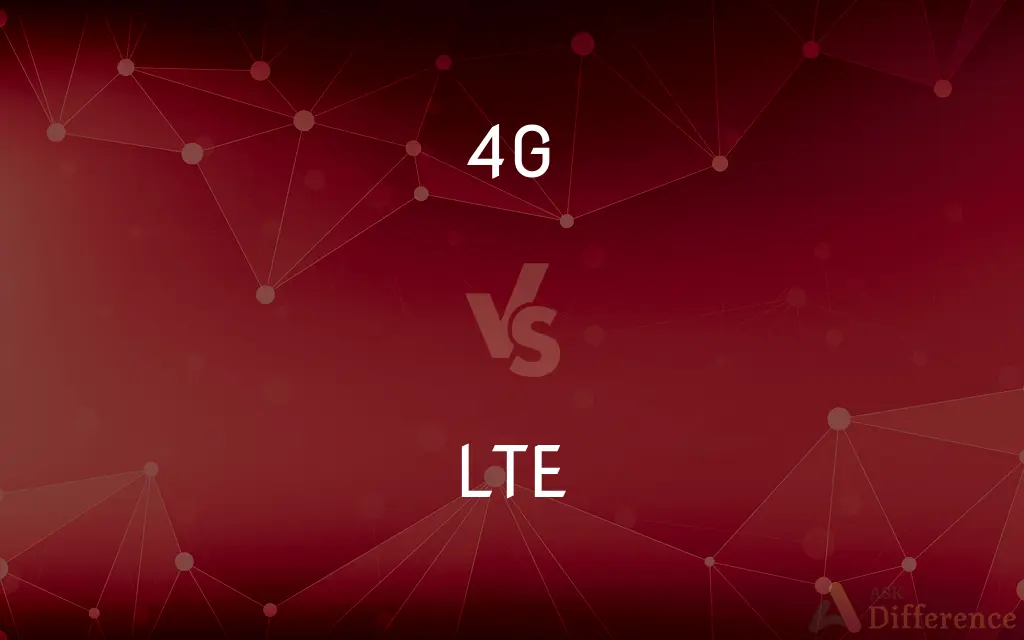4G vs. LTE — What's the Difference?
By Fiza Rafique & Urooj Arif — Published on July 24, 2024
4G is fourth generation of broadband cellular network technology, offering high data speed and improved network efficiency. LTE is standard for wireless broadband communication, moving a step towards achieving 4G speed but not meeting all 4G criteria.

Difference Between 4G and LTE
Table of Contents
ADVERTISEMENT
Key Differences
4G represents the fourth generation of cellular network technology, succeeding 3G and aimed at providing faster internet speeds, lower latency, and more reliable connectivity. It encompasses various technologies, including LTE (Long Term Evolution) and WiMAX, with LTE being the most widespread implementation of 4G. The International Telecommunications Union (ITU) sets the standards for what constitutes 4G technology, including peak data rates of at least 100 Mbps for high mobility communication and 1 Gbps for low mobility communication.
LTE, standing for Long Term Evolution, is considered the pathway to 4G, offering significantly increased peak data rates, reduced latency, scalable bandwidth capacity, and improved support for services. While LTE was designed to meet the 4G standards, the initial versions of LTE did not fully achieve the ITU's requirements for 4G technology. Therefore, LTE is sometimes referred to as 3.9G, representing a substantial improvement over 3G networks but just shy of the 4G threshold.
The distinction between 4G and LTE has become blurred over time, especially with the advent of LTE-Advanced (LTE-A). LTE-A is a true 4G standard that meets and even exceeds the ITU's requirements for 4G. This evolution of LTE brings it into full compliance with 4G standards, offering faster speeds and more reliable connections. As such, LTE-A is often marketed as 4G LTE Advanced, highlighting its status as the pinnacle of 4G technology.
In terms of user experience, both 4G and LTE provide substantial improvements over 3G networks, including quicker download and upload speeds, reduced latency, and better overall network performance. This enhances the usability of mobile internet for video streaming, online gaming, and other bandwidth-intensive applications. However, the performance benefits of true 4G (LTE-A) over standard LTE are particularly noticeable in densely populated areas where network congestion can significantly impact speeds and reliability.
The deployment of 4G and LTE technologies has significantly impacted mobile communication, enabling a host of new applications and services that require high-speed data transfer. As the infrastructure for these technologies continues to expand, users worldwide benefit from improved access to mobile broadband services, setting the stage for the next generation of cellular technology, 5G, which promises even greater speeds and more reliable connections.
ADVERTISEMENT
Comparison Chart
Definition
Fourth generation of cellular network technology.
A standard for wireless broadband communication towards 4G.
Speed
Up to 1 Gbps for low mobility.
Initially lower than 4G standards but improved with LTE-A.
Technology Standards
Includes LTE-A, meeting ITU 4G standards.
Initial versions did not meet 4G standards; LTE-A does.
Latency
Lower than LTE in its initial form.
Reduced latency compared to 3G, further improved with LTE-A.
User Experience
Faster download/upload speeds, improved network efficiency.
Significant improvements over 3G, with best performance in LTE-A.
ITU Compliance
Meets International Telecommunications Union requirements for 4G.
LTE-A meets 4G requirements, earlier LTE versions do not.
Compare with Definitions
4G
Offers at least 100 Mbps for high mobility and 1 Gbps for low mobility.
Downloading large files quickly while stationary with 4G.
LTE
Offers reduced latency and scalable bandwidth.
Enjoying quicker response times while browsing on LTE.
4G
Facilitates advanced mobile services and applications.
Engaging in high-quality video calls over a 4G network.
LTE
Designed to increase the capacity and speed of wireless data networks.
Streaming music smoothly on an LTE connection.
4G
The fourth generation of cellular network technology, providing high-speed internet.
Streaming HD video seamlessly on a 4G network.
LTE
Significantly enhances mobile internet experience over 3G.
Watching live sports with less buffering on LTE networks.
4G
Includes technologies like LTE-A that meet 4G standards.
Using LTE-A technology for ultra-fast mobile internet access.
LTE
Does not initially meet the ITU's 4G standards but improved with LTE-A.
Upgrading to LTE-A for enhanced network performance.
4G
Ensures improved network efficiency and lower latency.
Playing online games with minimal lag on 4G networks.
LTE
A standard for wireless communication that is a precursor to 4G.
Experiencing faster internet speeds on an LTE network compared to 3G.
Common Curiosities
What benefits does 4G offer over LTE?
True 4G (LTE-A) offers higher speeds, lower latency, and better efficiency compared to the initial versions of LTE.
Is LTE the same as 4G?
LTE is a significant step towards 4G but didn't initially meet all 4G standards until the introduction of LTE-Advanced.
Will my device automatically use LTE-A if it supports 4G?
If both the device and the network support LTE-A, the device can automatically leverage LTE-A for enhanced speeds and connectivity.
Why was LTE not considered true 4G initially?
The initial versions of LTE did not achieve the ITU's specified minimum speeds of 100 Mbps for high mobility and 1 Gbps for low mobility.
Can LTE and 4G coexist with 5G networks?
Yes, 5G networks are designed to work alongside 4G and LTE, providing seamless connectivity as users move between areas with different network coverage.
Can I get 4G speeds with LTE?
Yes, especially with LTE-Advanced, which provides true 4G speeds and fulfills the ITU's 4G standards.
How does LTE improve the mobile internet experience?
LTE offers significant improvements over 3G, including faster download and upload speeds, reduced latency, and better network reliability.
Are there significant differences in cost between LTE and 4G services?
Pricing can vary by carrier, but generally, access to faster speeds (including LTE and LTE-A) may come at a higher cost or require specific plans.
How does the deployment of 5G affect 4G and LTE?
The rollout of 5G introduces even faster speeds and lower latency. However, 4G and LTE will continue to be crucial for coverage and compatibility for the foreseeable future.
What is required to use 4G or LTE services?
A device that supports 4G or LTE technology and a mobile plan that provides access to a 4G or LTE network are required.
Share Your Discovery

Previous Comparison
Cold Boot vs. Warm Boot
Next Comparison
Fast Ethernet vs. Gigabit EthernetAuthor Spotlight
Written by
Fiza RafiqueFiza Rafique is a skilled content writer at AskDifference.com, where she meticulously refines and enhances written pieces. Drawing from her vast editorial expertise, Fiza ensures clarity, accuracy, and precision in every article. Passionate about language, she continually seeks to elevate the quality of content for readers worldwide.
Co-written by
Urooj ArifUrooj is a skilled content writer at Ask Difference, known for her exceptional ability to simplify complex topics into engaging and informative content. With a passion for research and a flair for clear, concise writing, she consistently delivers articles that resonate with our diverse audience.










































